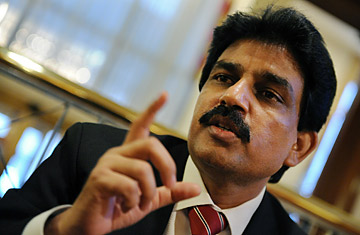
Pakistan's minority minister Shahbaz Bhatti in Washington, DC, Feb. 5th, 2010. Bhatti was brutally assassinated outside of his mothers home in Islamabad March 2nd after gunmen ambushed his vehicle and sprayed it with at least ten bullets.
In another chilling message to Pakistani politicians willing to speak out for the rights of suffering minorities, extremists on Wednesday murdered the country's Minister of Minorities. The assassination of Shahbaz Bhatti, the only Christian in the ruling cabinet, came just two months after the slaying of Punjab governor Salmaan Taseer, shot 27 times by his own bodyguard because he had called for changes in a blasphemy law used to persecute religious minorities. Bhatti was killed when gunmen ambushed his vehicle outside his home. And in both cases, the killers gleefully boasted that the same fate awaits anyone else who dares challenge their brutally intolerant brand of Islam.
For Pakistan's Christians, the assassination is a grim reminder of the peril that attaches to merely practicing their faith. "We've been attacked many, many times in our history," says Shimon Gill, a member of the All Pakistan Minority Alliance. "But now we have been orphaned. Who will speak up for us now?" Gill, a campaigner who had worked alongside Bhatti to secure the rights of Pakistan's minorities, says that the minister had long endured threats to his life. Those threats, however, had escalated after Bhatti joined forces with Taseer to speak in defense of Aasia Noreen, a Christian farm laborer sentenced to death under the draconian blasphemy laws. "Bhatti was undaunted," says Gill. "He told us that he was prepared to be martyred for our cause." In his home village, Bhatti's supporters came out on to the streets to torch tyres, beat their chests in protest and denounce his killers.
Militants linked to the Pakistani Taliban are suspected to be behind the assassination. Before the killers sped away in a car, they left pamphlets at the scene, proclaiming that "The only punishment for blasphemy against the Prophet is death". Bhatti's attempts to have Pakistan's blasphemy laws repealed was itself, in the eyes of his killers, an act of blasphemy. The pamphlet says that the assassination was a warning to "infidels" and "apostates". It was signed by "The organization of Al-Qaeda and the Punjabi Taliban," an odd formulation, combining the global jihadist group and the Punjabi branch of the Pakistani Taliban. Some of the language the document used to revere Islam's Prophet, however, is more commonly associated with the milder Barelvi sect, which is followed by the majority of Pakistani Muslims — and is at odds with the more austere Deobandi school of Islam favored by the local Taliban. Mumtaz Qadri, Taseer's confessed assassin, was a Barelvi.
Bhatti had predicted his own death, saying in a recently recorded video, "The forces of violence, militant banned organization, the Taliban and al-Qaeda, want to to impose the radical philosophy in Pakistan. Whoever stands against their radical philosophy, they threaten them." Bhatti insisted he was ready to "die for a cause", adding that he wanted defend the rights of his beleaguered community. "These threats and these warning cannot change my opinion and principles, he said. I would prefer to die for my principles, and for the justice of my community, rather than compromise on these threats."
In the weeks since Taseer's slaying, Pakistan's government has rushed to distance itself from the more tolerant advocacy associated with the slain governor and with Bhatti. A parade of ministers has repeatedly insisted that the ruling Pakistan Peoples Party (PPP) — to which both Taseer and Bhatti belonged — would not touch the blasphemy laws. The government had hoped the controversy over the controversial laws would die down. "Clearly the government was wrong," says Ali Dayan Hasan of Human Rights Watch. In the time that has passed, the religious right — composed of disparate and often fractious sects — has forged rare consensus over the issue of blasphemy and taken to the streets of Pakistans cities in tens of thousands. Qadri, Taseer's assassin, has been celebrated as a hero. Banned terror organizations such as the Lashkar-e-Taiba, blamed for the November 2008 Mumbai massacre, have joined them. And for the past month, they have sustained their fury by focusing it on the demand for the execution of Raymond Davis, a CIA contractor registered as a diplomat who killed two Pakistanis in January but says he acted in self-defense and who has claimed diplomatic immunity with the support of the U.S. government.
"The government has chosen to pursue a policy of appeasement in order to keep itself in power," laments Hasan of Human Rights Watch. "This policy is misguided and self-defeating. If the last three months are any indication, President Asif Ali Zardari may be the last man standing. The problem is that he wont be standing for very long. If one by one, the people who are supposed to uphold the politics of tolerance remain silent, they will have no viable prospects left." Bhatti's assassins warn in their pamphlet that they will "pick out" others from Zardari's "infidel government" and dispatch them "to hell" in the same manner.
The assassination also appears to have vanquished any hopes of reclaiming the secular Pakistan envisioned by its founder, Muhammad Ali Jinnah. "Jinnah's Pakistan died long ago," says Gill. The tragedy for Pakistan's minorities, adds Hasan, is that many of them don't have the option to leave. "They will have to live here regardless," he says. "The issue is not that they will become second class citizens, because they have been second class citizens for many, many years."
Still, Gill and other Christians remain resolute. "We refuse to be frightened," he says, his voice thick with emotion. "We have lost Bhatti, but we have not lost his philosophy. We are clear. We will continue to fight for our rights. Bhatti's martyrdom will give us the strength to do so."
